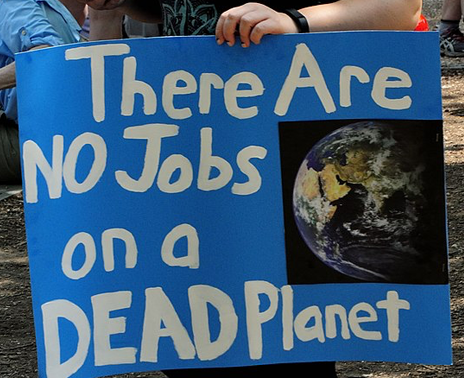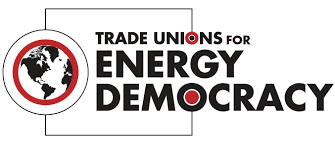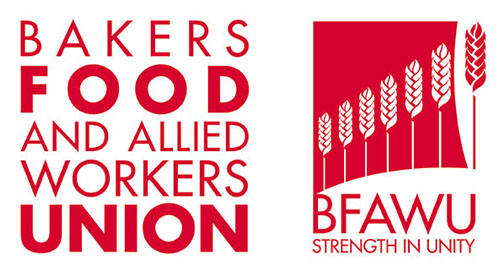Module 3: Trade Union Responses

Introduction
This Module looks at how the trade union movement is stepping up to the challenge of the climate crisis. If the climate crisis is to be tackled effectively, trade unions have a vital role to play.
Module 4 covers union-led green workplace campaigns, and how we can get involved in local and national campaigns about climate change.
There are as many trade union frontlines for tackling the climate crisis as there are trade unions!
- Many well-unionised energy-intensive industries have a huge ‘carbon footprint’ from the amounts of energy and resources they use – in power stations, steel works, food manufacture and other heavy industries. Reducing these emissions presents huge challenges.
- There are public and voluntary service frontlines, where, for example, environmental agency staff or firefighters tackle fires and floods. Or NHS staff treat increasing numbers of patients, particularly the frail elderly, for heatstroke, dehydration, and other heat-related conditions.
- There’s an education frontline, where our teachers, lecturers, trainers, researchers, managers, administrators and librarians all have a role to play in informing and raising awareness of the climate crisis.
- And there’s a transport frontline, because carbon emissions from road transport and aviation are rising rapidly, while much needed investment in public transport, including rail, bus and tram services, is totally inadequate.
Read the bmjopinion blog post from 2019, The summer we woke up to the health impact of climate change.
Many of these ‘frontline’ industries and services are well unionised. If the goal is to keep global temperature increases to below the ‘safe’ level of 1.5 degrees, then here in the UK, every union has some part to play. A top priority is campaigning against the austerity that denies our public services the resources they need, and the investment required for a sustainable future.
Trade unions are already backing demands for radical change.
- For a switch from petrol and diesel to electric and hybrid vehicles.
- Far greater investment in public transport and renewable energy.
- Home insulation and new ways to heat our homes.
- Sustainable agriculture, forestry and construction.
- And for new ways to manufacture products like steel, cement and chemicals that reduce the carbon emissions produced.
The trade union movement is the largest democratic movement in the world. The TUC represents more than 6.3 million workers in 52 unions. The TUC is calling for A just transition to a greener, fairer economy. It says, ‘The voices of workers who are at the forefront of dealing with the challenge of climate change must be at the centre of achieving a successful transition to the economy we will need.’
Globally, the union movement has approximately 175 million members in more than 150 countries. Combating climate change and helping workers and the communities they live in adapt to a changing world is a key trade union issue.
This module will look at how the trade union movement is stepping up to the challenge of the climate crisis
The International Trade Union Confederation (ITUC)
 As we saw in Module 2, the International Trade Union Confederation (ITUC) leads the international trade union response to the climate crisis. It’s all part of the ITUC’s mission to promote and defend workers’ rights and interests worldwide.
As we saw in Module 2, the International Trade Union Confederation (ITUC) leads the international trade union response to the climate crisis. It’s all part of the ITUC’s mission to promote and defend workers’ rights and interests worldwide.
The ITUC demands urgent action to tackle global overheating:
Unions want a global agreement implemented on the basis of just transition principles and plans: national and industry/enterprise plans that protect and create new jobs by investing in the necessary industrial transformation…there are no jobs on a dead planet.
Each year the ITUC submits a report to the United Nations’ climate change conference setting out its key demands. In 2022, these included:
- Implementation of just transition plans for the workforce
- Guarantee human rights, labour rights and inclusive participation.
- Raise mitigation ambition and create quality jobs with Just transition
- Adaptation needs social protection plans and funding
- Deliver on a loss and damage facility
- Provide the urgently needed climate finance to invest in just transition.
See the ITUC Report on COP27.
The ITUC works for international solidarity between trade unions to support these goals. Its regional organisations coordinate unions in each continent: the Asia-Pacific Regional Organisation (ITUC-AP); African Regional Organisation ITUC-AF); American Regional Organisation (TUCA); and European Trade Union Confederation (ETUC).
ITUC’s Just Transition Centre
The ITUC set up a Just Transition Centre in 2016. It brings together workers and their unions, communities, businesses and governments in social dialogue to ensure that labour has a seat at the table when planning for a Just Transition to a low-carbon world. The centre is building up a network of ‘good practice’ in Canada, Germany, the USA, Australia, the UK and elsewhere.
Worldwide, people are losing their lives and livelihood through climate change. The ITUC sees this as a major issue as it campaigns for workers’ rights, health and safety, and an end to poverty. As countries shift to renewable energies and a low carbon economy then workers and communities dependent on the fossil fuel industries for their income will suffer unless the transition is managed carefully. So a key aim of the ITUC is to develop a strategy for ‘a just transition’ for workers and communities, ‘to ensure we are all part of a sustainable, low carbon economy and benefit from decent and green jobs.’ (1)
Watch the interview with Sharan Burrow, former ITUC General Secretary talking about the effects on the world’s workforce of a changing climate.
As Sharan explained in the interview, prior to the 2015 Paris Summit the ITUC launched ‘a call for dialogue’ over ‘a just transition.’
Below is a section from that ITUC document outlining what is meant by a just transition.
A Just Transition means:
- Giving unions a voice, from the workplace to the highest levels of government. Negotiations with government and employers. Collective bargaining with workers and their unions for workplace change, boosting productivity and skills.
- Investment in jobs and skills – providing decent work opportunities in sectors which cut emissions.
- Invest in community renewal to win the trust of regions and communities at the forefront of industrial change.
- Respect the contribution that workers in fossil-fuel industries have made to today’s prosperity. Provide them with income support, retraining and redeployment opportunities, and secure pensions for older workers
- Guarantee social protection and human rights
- Support innovation and technology sharing to enable a rapid transformation of energy and manufacturing.
- Decent work and union rights in the transition to a low carbon economy.
Call for Dialogue: Climate Action Requires Just Transition (2)
Watch the following video where Peter Colley (National Research Director for the Construction, Forestry, Mining and Energy Union in Australia) talks about what a just transition means for one set of workers, those working in the coal industry.
Ending Climate Change Demands a JustTransition for Coal Workers
The European Trades Union Congress
The ETUC leads the European trade union delegation to the UN climate conferences and lobbies the European Commission and Parliament for tough action to cut greenhouse gas emissions and create sustainable jobs for the future.
 The ETUC argues that energy and industrial policy must work hand in hand to tackle climate breakdown.
The ETUC argues that energy and industrial policy must work hand in hand to tackle climate breakdown.
It calls for a Just Transition and supports trade unions campaigns across the EU. One of the projects it helped get underway is the Low Carbon Task Force in Yorkshire and Humber, led by the regional TUC and its union and other partners. The Yorkshire region has the highest carbon footprint of any UK region, with its combination of heavy industries and power stations.
Involving Trade Unions in climate action to build a Just Transition: guide & video
The Trades Union Congress (TUC)
The TUC brings together unions in the UK to agree common policies on issues that matter to working people and their communities. It represents more than 5.5 million workers in 48 unions.
Much TUC policy on energy and the climate crisis is developed through debates at the organisation’s annual Congress. Following cross-union support for a just transition, the TUC published A just transition to a greener, fairer economy (July 2019). Its demands include:
- A Commission on long-term energy strategy for a low carbon future. Unions, industry and consumers should be at the table.
- Workplace Transition Agreements in companies and organisations: covering jobs, skills, pay and other issues. Unions should have access to all workplaces to explain the benefits of trade unions.
- Every worker should have access to funding to improve their skills. ‘Workers in energy-intensive sectors have the skills and expertise that will be required to help these sectors transition to lower carbon models.’ Support for apprenticeships, the best guarantor of skills excellence. Proper funding of the adult education sector.
- Government-led investment in household energy efficiency, public transport, and public service responses to extreme weather.
- The ‘green economy’ (and beyond) must recognise unions and bargain with them to ensure good quality jobs ‘with terms and conditions at least as good as those in energy and carbon-intensive sectors.’
The TUC’s work on energy and climate change also includes greening the workplace. In 2014, a TUC report on The Union Effect- Greening the Workplace, showed how union reps led green workplace initiatives. It included case studies and best practice examples in energy saving, resources, recycling, waste management and green travel plans. The TUC now wants statutory rights for trade union environment reps, both in terms of training and facility time. Their role would be to:
- promote environmentally sustainable workplace initiatives and practices
- carry out environmental risk assessments and audits
- consult on workplace environmental policies, practices and management systems
- receive relevant training (5)
Energy
The TUC supports a transition to a balanced, net zero carbon energy mix, in line with scientific targets, including renewable power, nuclear, and hydrogen. The TUC advocates for public energy companies to champion building new clean energy capacity (e.g. floating offshore wind farms) and make sure these are built on time and create good jobs. Public energy companies should also have a role to play in bringing down energy bills and making sure our homes don’t waste energy.
However, union opinions vary on some of these priorities, notably the role of hydrogen for heating homes and nuclear power. On gas in our future energy mix, some unions support a nationwide switch to hydrogen for heating our homes. Others argue that natural gas, or methane, is a fossil fuel with no longer term future in a zero carbon Britain. On nuclear power, proponents argue that our highly regulated nuclear industry and the low-carbon electricity it generates is essential to ensuring security of supply and keeping the lights on. Those opposed are concerned about cost, safety and the dangerous waste which has the potential to be harmful for tens of thousands of years.
Some trade unions have clear policy opposing shale gas extraction on environmental and climate change grounds. The TUC’s approach to ‘fracking’ is based on the “precautionary principle,” which effectively means supporting a suspension of shale gas exploration, because of the occupational, environmental and regulatory issues involved.
International
 The TUC and its affiliates have strongly supported the efforts of the ITUC to lobby for a strong and effective global agreement on climate change. The Paris Agreement set a new goal to reach zero emissions by the middle of the century.
The TUC and its affiliates have strongly supported the efforts of the ITUC to lobby for a strong and effective global agreement on climate change. The Paris Agreement set a new goal to reach zero emissions by the middle of the century.
The TUC argues that:
Climate change affects our brothers and sisters – especially our sisters – across the world. UN figures show that 80 percent of those displaced by climate change are women. The Paris Agreement identifies global solutions to a global problem; it has made specific provision for the empowerment of women, recognising that they are disproportionately impacted by climate change, and a just transition must provide fairness and overcome injustices experienced by all workers, male and female, young and old, black and white, in the global north and south.
The UK is now legally bound by the 2008 Climate Change Act to reduce emissions by 100% by 2050 but the courts have found that the government’s current plans are not adequate to meet their targets – so an updated plan will have to be in place by the end of March 2023.
Trades Unions
As well as the common policies agreed by the annual Congress of the TUC, many unions have developed their own policies and campaigns around climate change and the environment. Below are some examples.
UNISON
UNISON, the public services union with 1.3 million members, has called for strong action on climate change for many years.
Green UNISON Week – for the last four years UNISON’s branches across the UK have organised a week of local and national activities in September (to coincide with national green week) to call for urgent action to tackle climate change.
Green Reps in UNISON – in 2022 UNISON members voted overwhelmingly, at their annual National Delegate Conference to include Environmental Officer as one of the mandatory officer roles for every UNISON branch. Training and support for the new role isa key prioritie in 2023.
UNISON’s Climate change and your pension: divestment guide to campaigning through your branch for your local government pension fund to pull all investments in fossil fuels, commonly known as divestment.
Anti-trade union laws mean that UNISON branches cannot take strike action on Climate Change but there are many ways to show support.
Public and Commercial Services Union (PCS)
PCS has a long and proud record of bargaining and campaigning on green issues both within and outside the workplace. Tackling climate change and environmental degradation is integral to our industrial agenda, and our green reps and members are vital to ensuring we put our policies into practice as part of a Just Transition.
John Moloney, PCS Assistant General Secretary
The Public and Commercial Services Union is one of the largest trade unions in the UK with approximately 200,000 members. They represent workers in the civil service, the public sector, and some commercial organisations.
PCS’s environmental and climate change work focuses on the following areas;
1. Workplaces
Building a cadre of workplace environmental or ‘green’ reps supported with negotiators guidance, a climate justice and green reps training course, a green e-news service, and facilitation of networks across employer groups, regions, and nations. PCS supports the campaign for statutory rights for workplace environmental reps and promotes the need for consultation machinery on sustainability at all levels of PCS employers including with central government. It also supports members and reps working together on alternative workplace proposals such as the creation of a National Climate Service, a key demand of the climate jobs campaign.
2. Campaigns and activism
PCS works with a number of campaign groups including the Greener Jobs Alliance, the Campaign against Climate Change Trade Union Group, Fuel Poverty Action and the global Trade Union for Energy Democracy initiative. It’s also active in fossil fuel divestment, just transition and workers’ rights. They increasingly work with environmental and social justice groups to link their campaigning to just transition , and refugee/migrant rights. It is a member of the Climate Justice Coalition, playing a lead role in organising the CJC trade union caucus.
3. Policy
PCS policy is determined by members at its Annual Delegate Conference. Areas include energy transition to 100% renewable energy under public ownership and democratic control. Opposing nuclear power and weapons, fracking, a third runway at Heathrow and false climate solutions such as carbon capture and storage. It seeks to counter anti-migrant attacks and climate denial support the need to recognise the UK’s historic contribution to climate change and its impacts on the most vulnerable
Contact green@pcs.org.uk for more information on its campaigns and policy work.
University and College Union (UCU)
The UCU represents over 120,000 academics, lecturers, trainers, instructors, researchers, managers, administrators, computer staff, librarians and postgraduates in universities, colleges, prisons, adult education and training organisations across the UK.
UCU has established a network of over 150 UCU Environment Representatives, supplemented with training courses on the Role of the Environment Rep. UCU also provides free training for all members on themes related to climate, sustainability and education. Key sustainability work of UCU includes:
- encouraging all branches to have at least one ‘environment or green rep’ – to negotiate locally for UCU’s Green New Deal for colleges & universities
- encourage all branches to work in conjunction with campus stakeholders including student representatives and local communities to convene ‘action groups’ · locally and nationally UCU works with other trade unions and the TUC to press for greener government policies.
UCU action areas and campaigns:
UCU Green New Deal (GND). The Green New Deal (GND) brings together policy set by both UCU and NUS within a negotiating and bargaining framework.
Demands include that institutions declare a climate emergency, agree concrete time limited action plans on embedding meaningful environmental policies, climate proof their curriculums, sign up to ethical investment and banking strategies, review food and land use, travel policies and carbon and energy management commitments.
The UCU GND lays out a Just Transition framework for whole institution change to take action on the climate and ecological emergency. It was launched in 2021. In 2022 Liverpool UCU branch launched their branch specific GND claim, engaging with their employer. More information can be found here.
UNITE
 “Unions are calling on the UN not only to agree to halt global warming and reverse carbon emissions, Unite….. believes it is crucial that there must be a ‘just transition’ in the changes that lie ahead…… a just transition means a place at the table, investment in green and decent jobs and new skills, a balanced energy, low carbon economy and respect for labour and human rights.” (9)
“Unions are calling on the UN not only to agree to halt global warming and reverse carbon emissions, Unite….. believes it is crucial that there must be a ‘just transition’ in the changes that lie ahead…… a just transition means a place at the table, investment in green and decent jobs and new skills, a balanced energy, low carbon economy and respect for labour and human rights.” (9)
Len McClusky, Unite General Secretary
UNITE is Britain’s biggest union with 1.42 million members in every type of workplace.
In a recently published briefing paper, ‘Meeting the Climate Challenge’, Unite sees a balanced energy policy, a just transition to a low carbon economy and the growth of climate jobs as key parts of meeting that challenge.
In addition Unite campaigns around the following:
- investment in renewable and low-carbon energy
- new build homes to be fully energy efficient
- appropriate incentives to improve home and business insulation
- businesses to audit their energy use to be as efficient as possible
- support for trade union representatives to promote energy efficient workplaces and meet the climate change challenge.
Click here for more details on UNITE’s policy and campaigns around climate change.
National Education Union (NEU)
represents…..
The Bakers, Food and Allied Workers Union (BFAWU) successfully moved a motion around climate change at the TUC Congress in 2017, calling for a just transition to a renewable energy industry, energy democracy and recognition of environmental reps.
BFAWU has been working away in the background to develop its environmental strategy:
- Adapting the current Health and Safety Reps role to include an environmental aspect – transitioning into safety, health and environment reps (SHE).
- Publishing a Green version of their journal the Foodworker to coincide with COP each year and focusing entirely on environmental issues.
- There are dedicated social media accounts @BFAWUGreenstuff on Facebook and Twitter page @BFAWUS.
For content to go into the newsletter, or to find out more, contact: Green@bfawu.org
Trade Unions for Energy Democracy
Trade Unions for Energy Democracy (TUED) is an international network which calls for publicly and democratically owned energy. This would mean restructuring the global energy system to scale up renewable energy, energy efficiency and job creation.(7)
Watch the following animation that explains what is meant by energy democracy.
This Is What Energy Democracy Looks Like
These are just some examples of individual union policies and good practice in tackling climate change and greening the workplace. You can find details of your union’s policies on their website or by contacting their research department. Trade unions have a long history of taking action on environmental issues as they’ve campaigned for safer, healthier, working and living environments. Consequently, they have a unique and valuable role to play in raising awareness and mobilising people to address the challenge of climate change.
In the following video published by the ITUC straight after the Paris Agreement, trade unionists and climate campaigners talk about the importance of the labour movement working together with other social movements to tackle climate change and fight for a just transition to a zero-carbon economy.
After Paris: Organising for a #JustTransition
Further reference
Trade Unions for Energy Democracy



